NURS2101: Diabetes Mellitus Experience Report, Semester 1, 2019
VerifiedAdded on 2023/02/01
|8
|2547
|43
Report
AI Summary
This report delves into the lived experiences of individuals with diabetes mellitus, focusing on the challenges and obstacles they face. The report analyzes three key studies that explore the perspectives of adolescents and adults with type 1 diabetes, their families, and healthcare professionals. The studies highlight the impact of diabetes on daily activities, academic performance, and quality of life, emphasizing issues such as the lack of communication between patients and healthcare providers, difficulties in managing the disease, and the emotional and social consequences of uncontrolled blood sugar levels. The report also identifies common themes across the studies, including the importance of patient-centered care, family support, and the development of effective educational programs to improve patient outcomes. Furthermore, the report emphasizes the need for improved communication and collaboration among patients, families, and healthcare professionals to enhance the overall quality of life for individuals living with diabetes.
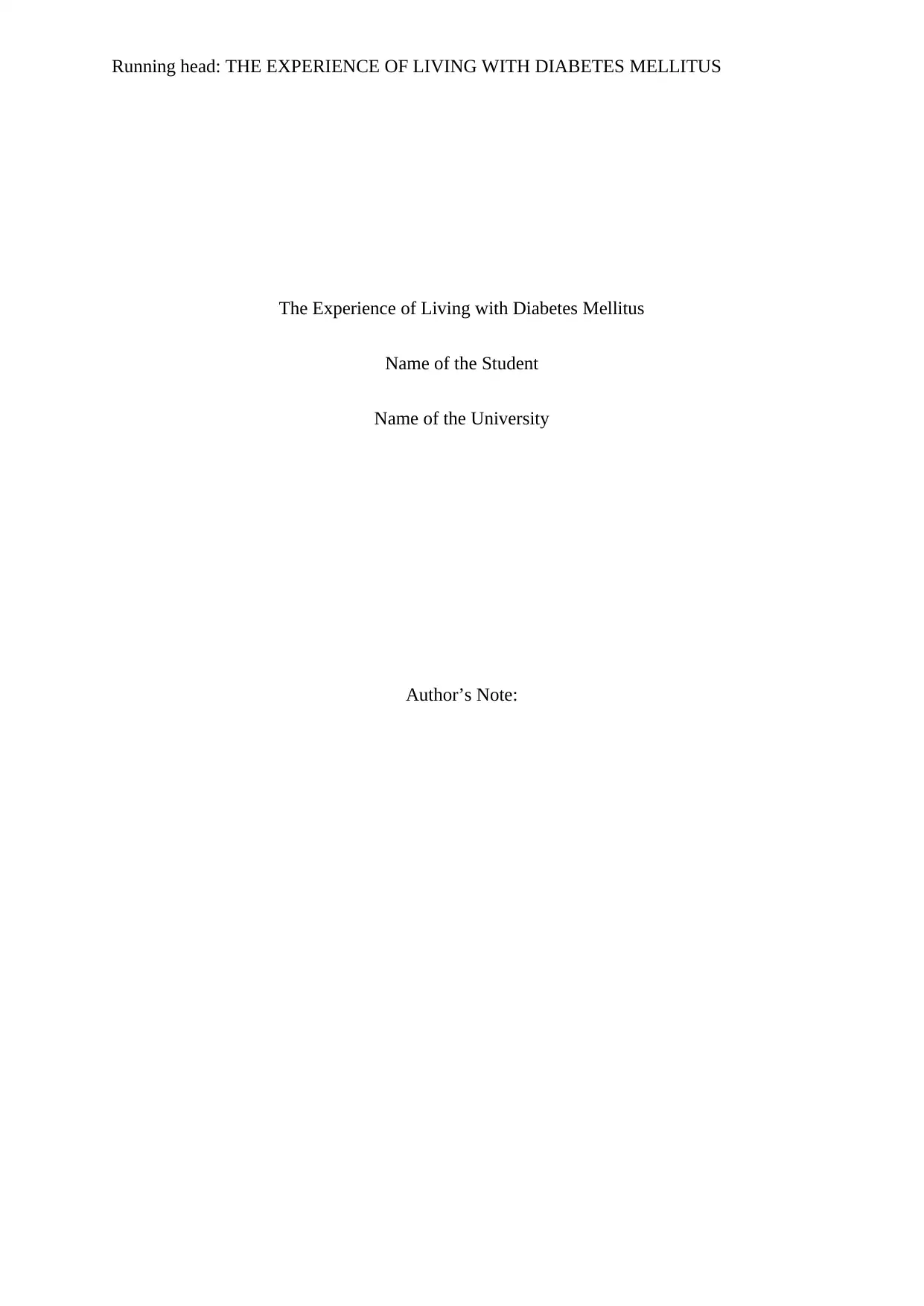
Running head: THE EXPERIENCE OF LIVING WITH DIABETES MELLITUS
The Experience of Living with Diabetes Mellitus
Name of the Student
Name of the University
Author’s Note:
The Experience of Living with Diabetes Mellitus
Name of the Student
Name of the University
Author’s Note:
Paraphrase This Document
Need a fresh take? Get an instant paraphrase of this document with our AI Paraphraser
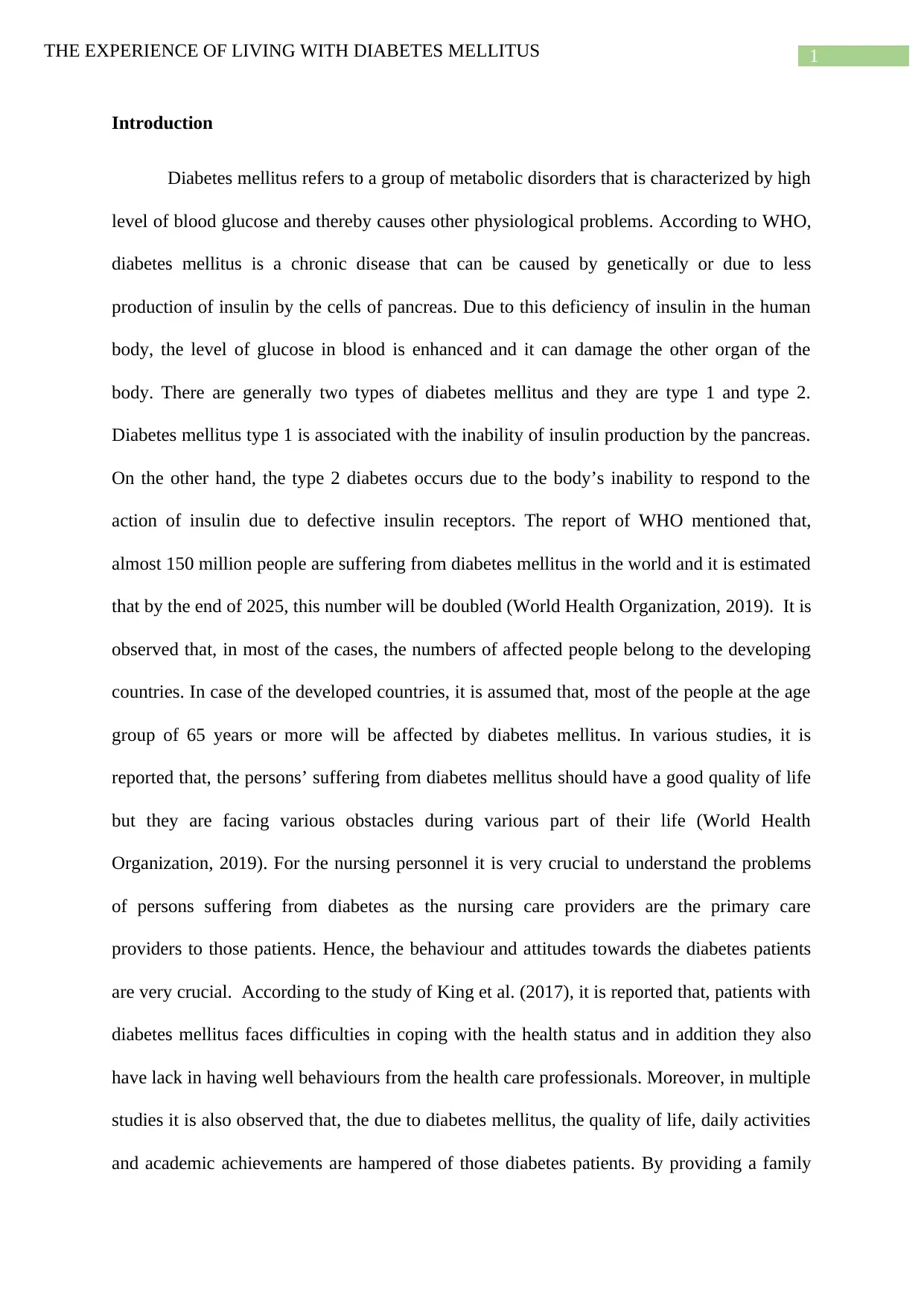
1THE EXPERIENCE OF LIVING WITH DIABETES MELLITUS
Introduction
Diabetes mellitus refers to a group of metabolic disorders that is characterized by high
level of blood glucose and thereby causes other physiological problems. According to WHO,
diabetes mellitus is a chronic disease that can be caused by genetically or due to less
production of insulin by the cells of pancreas. Due to this deficiency of insulin in the human
body, the level of glucose in blood is enhanced and it can damage the other organ of the
body. There are generally two types of diabetes mellitus and they are type 1 and type 2.
Diabetes mellitus type 1 is associated with the inability of insulin production by the pancreas.
On the other hand, the type 2 diabetes occurs due to the body’s inability to respond to the
action of insulin due to defective insulin receptors. The report of WHO mentioned that,
almost 150 million people are suffering from diabetes mellitus in the world and it is estimated
that by the end of 2025, this number will be doubled (World Health Organization, 2019). It is
observed that, in most of the cases, the numbers of affected people belong to the developing
countries. In case of the developed countries, it is assumed that, most of the people at the age
group of 65 years or more will be affected by diabetes mellitus. In various studies, it is
reported that, the persons’ suffering from diabetes mellitus should have a good quality of life
but they are facing various obstacles during various part of their life (World Health
Organization, 2019). For the nursing personnel it is very crucial to understand the problems
of persons suffering from diabetes as the nursing care providers are the primary care
providers to those patients. Hence, the behaviour and attitudes towards the diabetes patients
are very crucial. According to the study of King et al. (2017), it is reported that, patients with
diabetes mellitus faces difficulties in coping with the health status and in addition they also
have lack in having well behaviours from the health care professionals. Moreover, in multiple
studies it is also observed that, the due to diabetes mellitus, the quality of life, daily activities
and academic achievements are hampered of those diabetes patients. By providing a family
Introduction
Diabetes mellitus refers to a group of metabolic disorders that is characterized by high
level of blood glucose and thereby causes other physiological problems. According to WHO,
diabetes mellitus is a chronic disease that can be caused by genetically or due to less
production of insulin by the cells of pancreas. Due to this deficiency of insulin in the human
body, the level of glucose in blood is enhanced and it can damage the other organ of the
body. There are generally two types of diabetes mellitus and they are type 1 and type 2.
Diabetes mellitus type 1 is associated with the inability of insulin production by the pancreas.
On the other hand, the type 2 diabetes occurs due to the body’s inability to respond to the
action of insulin due to defective insulin receptors. The report of WHO mentioned that,
almost 150 million people are suffering from diabetes mellitus in the world and it is estimated
that by the end of 2025, this number will be doubled (World Health Organization, 2019). It is
observed that, in most of the cases, the numbers of affected people belong to the developing
countries. In case of the developed countries, it is assumed that, most of the people at the age
group of 65 years or more will be affected by diabetes mellitus. In various studies, it is
reported that, the persons’ suffering from diabetes mellitus should have a good quality of life
but they are facing various obstacles during various part of their life (World Health
Organization, 2019). For the nursing personnel it is very crucial to understand the problems
of persons suffering from diabetes as the nursing care providers are the primary care
providers to those patients. Hence, the behaviour and attitudes towards the diabetes patients
are very crucial. According to the study of King et al. (2017), it is reported that, patients with
diabetes mellitus faces difficulties in coping with the health status and in addition they also
have lack in having well behaviours from the health care professionals. Moreover, in multiple
studies it is also observed that, the due to diabetes mellitus, the quality of life, daily activities
and academic achievements are hampered of those diabetes patients. By providing a family
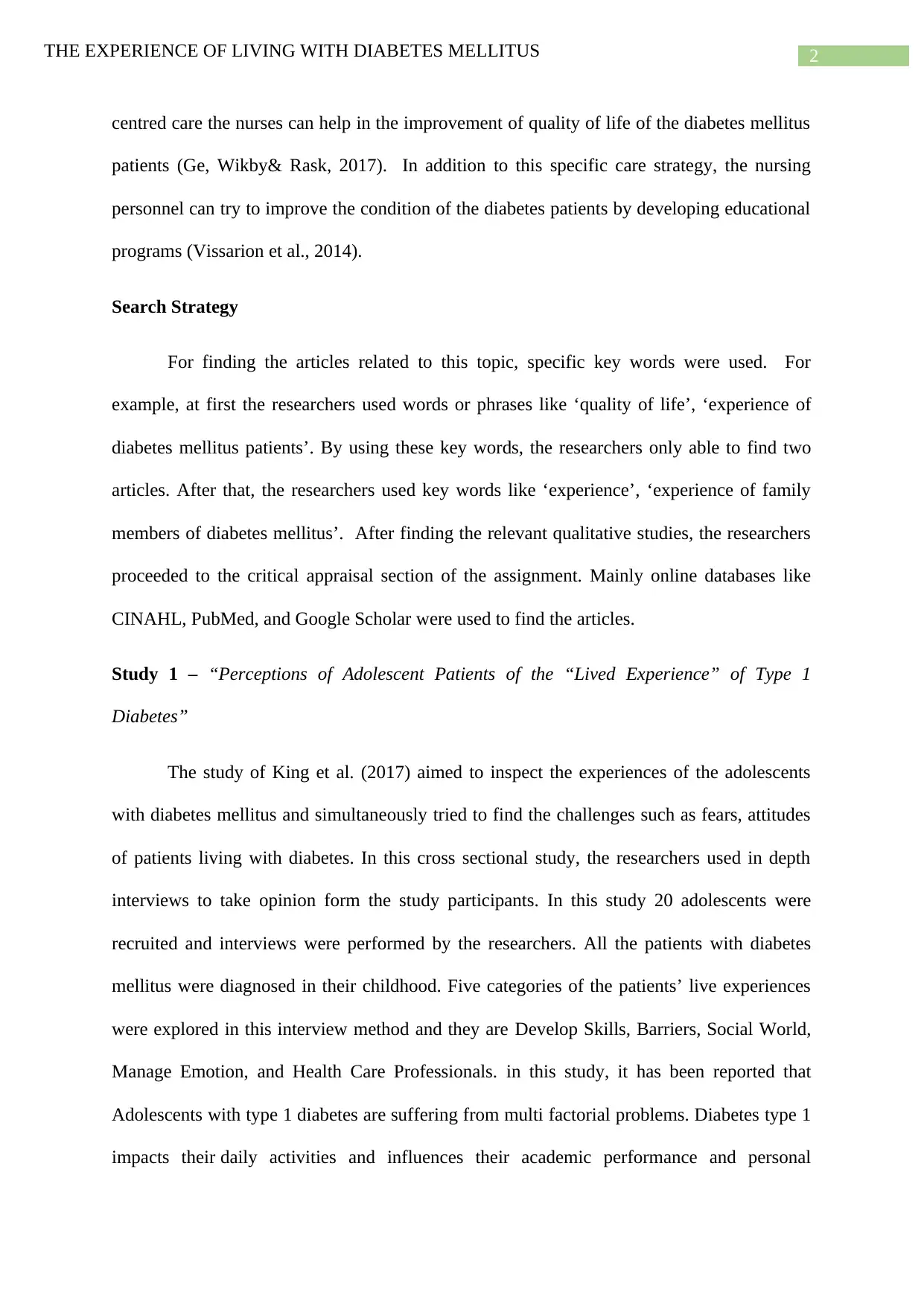
2THE EXPERIENCE OF LIVING WITH DIABETES MELLITUS
centred care the nurses can help in the improvement of quality of life of the diabetes mellitus
patients (Ge, Wikby& Rask, 2017). In addition to this specific care strategy, the nursing
personnel can try to improve the condition of the diabetes patients by developing educational
programs (Vissarion et al., 2014).
Search Strategy
For finding the articles related to this topic, specific key words were used. For
example, at first the researchers used words or phrases like ‘quality of life’, ‘experience of
diabetes mellitus patients’. By using these key words, the researchers only able to find two
articles. After that, the researchers used key words like ‘experience’, ‘experience of family
members of diabetes mellitus’. After finding the relevant qualitative studies, the researchers
proceeded to the critical appraisal section of the assignment. Mainly online databases like
CINAHL, PubMed, and Google Scholar were used to find the articles.
Study 1 – “Perceptions of Adolescent Patients of the “Lived Experience” of Type 1
Diabetes”
The study of King et al. (2017) aimed to inspect the experiences of the adolescents
with diabetes mellitus and simultaneously tried to find the challenges such as fears, attitudes
of patients living with diabetes. In this cross sectional study, the researchers used in depth
interviews to take opinion form the study participants. In this study 20 adolescents were
recruited and interviews were performed by the researchers. All the patients with diabetes
mellitus were diagnosed in their childhood. Five categories of the patients’ live experiences
were explored in this interview method and they are Develop Skills, Barriers, Social World,
Manage Emotion, and Health Care Professionals. in this study, it has been reported that
Adolescents with type 1 diabetes are suffering from multi factorial problems. Diabetes type 1
impacts their daily activities and influences their academic performance and personal
centred care the nurses can help in the improvement of quality of life of the diabetes mellitus
patients (Ge, Wikby& Rask, 2017). In addition to this specific care strategy, the nursing
personnel can try to improve the condition of the diabetes patients by developing educational
programs (Vissarion et al., 2014).
Search Strategy
For finding the articles related to this topic, specific key words were used. For
example, at first the researchers used words or phrases like ‘quality of life’, ‘experience of
diabetes mellitus patients’. By using these key words, the researchers only able to find two
articles. After that, the researchers used key words like ‘experience’, ‘experience of family
members of diabetes mellitus’. After finding the relevant qualitative studies, the researchers
proceeded to the critical appraisal section of the assignment. Mainly online databases like
CINAHL, PubMed, and Google Scholar were used to find the articles.
Study 1 – “Perceptions of Adolescent Patients of the “Lived Experience” of Type 1
Diabetes”
The study of King et al. (2017) aimed to inspect the experiences of the adolescents
with diabetes mellitus and simultaneously tried to find the challenges such as fears, attitudes
of patients living with diabetes. In this cross sectional study, the researchers used in depth
interviews to take opinion form the study participants. In this study 20 adolescents were
recruited and interviews were performed by the researchers. All the patients with diabetes
mellitus were diagnosed in their childhood. Five categories of the patients’ live experiences
were explored in this interview method and they are Develop Skills, Barriers, Social World,
Manage Emotion, and Health Care Professionals. in this study, it has been reported that
Adolescents with type 1 diabetes are suffering from multi factorial problems. Diabetes type 1
impacts their daily activities and influences their academic performance and personal
⊘ This is a preview!⊘
Do you want full access?
Subscribe today to unlock all pages.

Trusted by 1+ million students worldwide
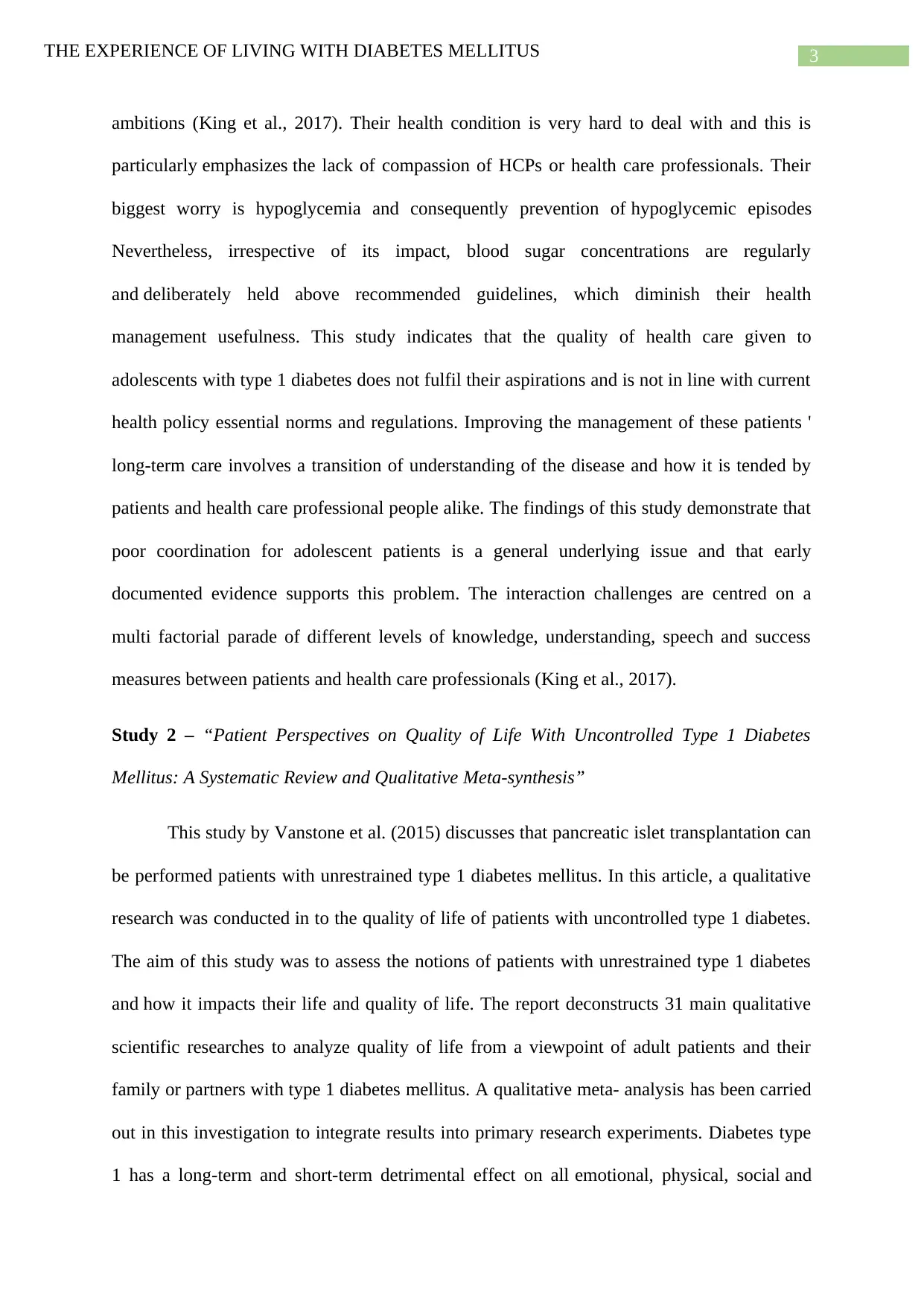
3THE EXPERIENCE OF LIVING WITH DIABETES MELLITUS
ambitions (King et al., 2017). Their health condition is very hard to deal with and this is
particularly emphasizes the lack of compassion of HCPs or health care professionals. Their
biggest worry is hypoglycemia and consequently prevention of hypoglycemic episodes
Nevertheless, irrespective of its impact, blood sugar concentrations are regularly
and deliberately held above recommended guidelines, which diminish their health
management usefulness. This study indicates that the quality of health care given to
adolescents with type 1 diabetes does not fulfil their aspirations and is not in line with current
health policy essential norms and regulations. Improving the management of these patients '
long-term care involves a transition of understanding of the disease and how it is tended by
patients and health care professional people alike. The findings of this study demonstrate that
poor coordination for adolescent patients is a general underlying issue and that early
documented evidence supports this problem. The interaction challenges are centred on a
multi factorial parade of different levels of knowledge, understanding, speech and success
measures between patients and health care professionals (King et al., 2017).
Study 2 – “Patient Perspectives on Quality of Life With Uncontrolled Type 1 Diabetes
Mellitus: A Systematic Review and Qualitative Meta-synthesis”
This study by Vanstone et al. (2015) discusses that pancreatic islet transplantation can
be performed patients with unrestrained type 1 diabetes mellitus. In this article, a qualitative
research was conducted in to the quality of life of patients with uncontrolled type 1 diabetes.
The aim of this study was to assess the notions of patients with unrestrained type 1 diabetes
and how it impacts their life and quality of life. The report deconstructs 31 main qualitative
scientific researches to analyze quality of life from a viewpoint of adult patients and their
family or partners with type 1 diabetes mellitus. A qualitative meta- analysis has been carried
out in this investigation to integrate results into primary research experiments. Diabetes type
1 has a long-term and short-term detrimental effect on all emotional, physical, social and
ambitions (King et al., 2017). Their health condition is very hard to deal with and this is
particularly emphasizes the lack of compassion of HCPs or health care professionals. Their
biggest worry is hypoglycemia and consequently prevention of hypoglycemic episodes
Nevertheless, irrespective of its impact, blood sugar concentrations are regularly
and deliberately held above recommended guidelines, which diminish their health
management usefulness. This study indicates that the quality of health care given to
adolescents with type 1 diabetes does not fulfil their aspirations and is not in line with current
health policy essential norms and regulations. Improving the management of these patients '
long-term care involves a transition of understanding of the disease and how it is tended by
patients and health care professional people alike. The findings of this study demonstrate that
poor coordination for adolescent patients is a general underlying issue and that early
documented evidence supports this problem. The interaction challenges are centred on a
multi factorial parade of different levels of knowledge, understanding, speech and success
measures between patients and health care professionals (King et al., 2017).
Study 2 – “Patient Perspectives on Quality of Life With Uncontrolled Type 1 Diabetes
Mellitus: A Systematic Review and Qualitative Meta-synthesis”
This study by Vanstone et al. (2015) discusses that pancreatic islet transplantation can
be performed patients with unrestrained type 1 diabetes mellitus. In this article, a qualitative
research was conducted in to the quality of life of patients with uncontrolled type 1 diabetes.
The aim of this study was to assess the notions of patients with unrestrained type 1 diabetes
and how it impacts their life and quality of life. The report deconstructs 31 main qualitative
scientific researches to analyze quality of life from a viewpoint of adult patients and their
family or partners with type 1 diabetes mellitus. A qualitative meta- analysis has been carried
out in this investigation to integrate results into primary research experiments. Diabetes type
1 has a long-term and short-term detrimental effect on all emotional, physical, social and
Paraphrase This Document
Need a fresh take? Get an instant paraphrase of this document with our AI Paraphraser
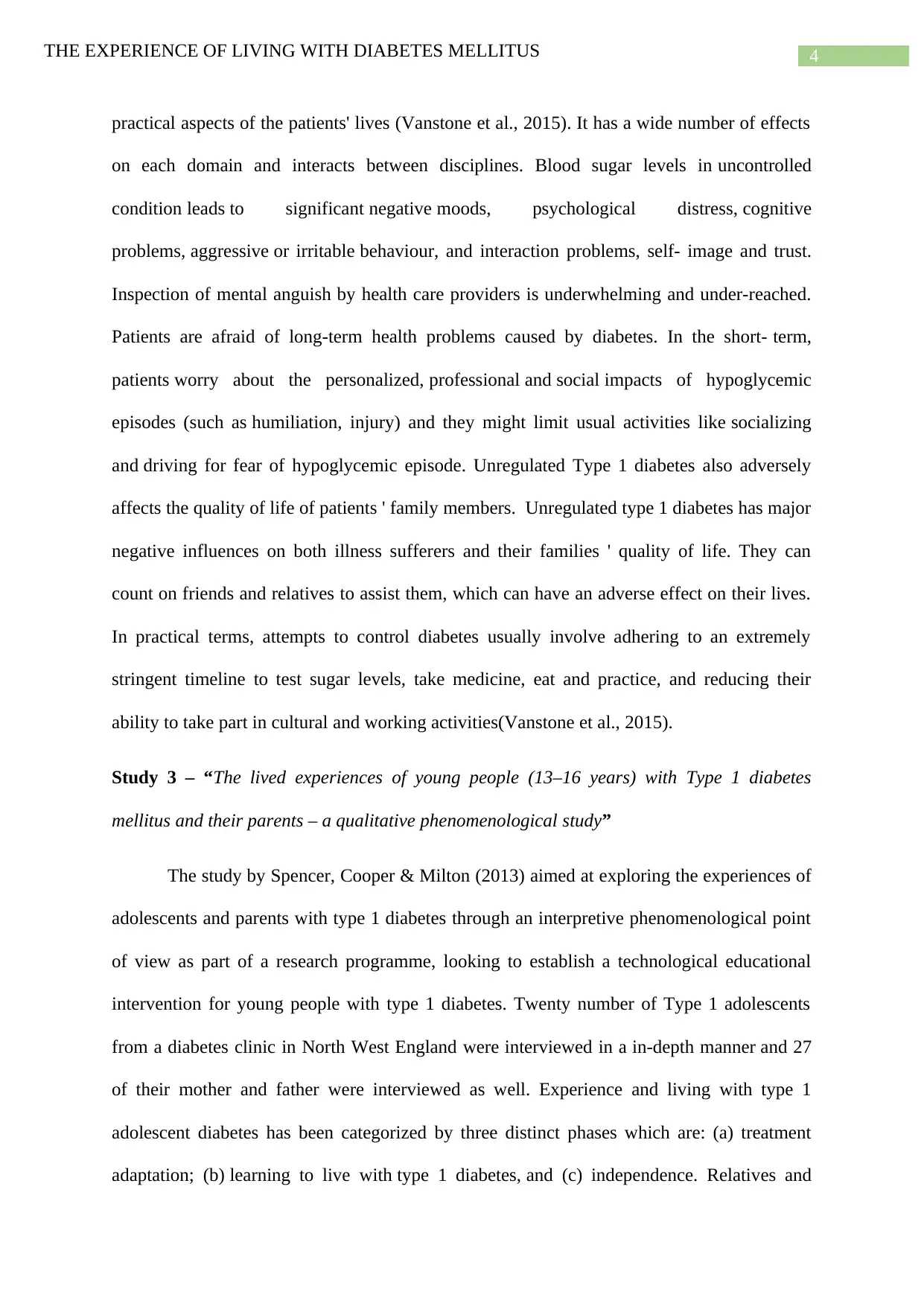
4THE EXPERIENCE OF LIVING WITH DIABETES MELLITUS
practical aspects of the patients' lives (Vanstone et al., 2015). It has a wide number of effects
on each domain and interacts between disciplines. Blood sugar levels in uncontrolled
condition leads to significant negative moods, psychological distress, cognitive
problems, aggressive or irritable behaviour, and interaction problems, self- image and trust.
Inspection of mental anguish by health care providers is underwhelming and under-reached.
Patients are afraid of long-term health problems caused by diabetes. In the short- term,
patients worry about the personalized, professional and social impacts of hypoglycemic
episodes (such as humiliation, injury) and they might limit usual activities like socializing
and driving for fear of hypoglycemic episode. Unregulated Type 1 diabetes also adversely
affects the quality of life of patients ' family members. Unregulated type 1 diabetes has major
negative influences on both illness sufferers and their families ' quality of life. They can
count on friends and relatives to assist them, which can have an adverse effect on their lives.
In practical terms, attempts to control diabetes usually involve adhering to an extremely
stringent timeline to test sugar levels, take medicine, eat and practice, and reducing their
ability to take part in cultural and working activities(Vanstone et al., 2015).
Study 3 – “The lived experiences of young people (13–16 years) with Type 1 diabetes
mellitus and their parents – a qualitative phenomenological study”
The study by Spencer, Cooper & Milton (2013) aimed at exploring the experiences of
adolescents and parents with type 1 diabetes through an interpretive phenomenological point
of view as part of a research programme, looking to establish a technological educational
intervention for young people with type 1 diabetes. Twenty number of Type 1 adolescents
from a diabetes clinic in North West England were interviewed in a in-depth manner and 27
of their mother and father were interviewed as well. Experience and living with type 1
adolescent diabetes has been categorized by three distinct phases which are: (a) treatment
adaptation; (b) learning to live with type 1 diabetes, and (c) independence. Relatives and
practical aspects of the patients' lives (Vanstone et al., 2015). It has a wide number of effects
on each domain and interacts between disciplines. Blood sugar levels in uncontrolled
condition leads to significant negative moods, psychological distress, cognitive
problems, aggressive or irritable behaviour, and interaction problems, self- image and trust.
Inspection of mental anguish by health care providers is underwhelming and under-reached.
Patients are afraid of long-term health problems caused by diabetes. In the short- term,
patients worry about the personalized, professional and social impacts of hypoglycemic
episodes (such as humiliation, injury) and they might limit usual activities like socializing
and driving for fear of hypoglycemic episode. Unregulated Type 1 diabetes also adversely
affects the quality of life of patients ' family members. Unregulated type 1 diabetes has major
negative influences on both illness sufferers and their families ' quality of life. They can
count on friends and relatives to assist them, which can have an adverse effect on their lives.
In practical terms, attempts to control diabetes usually involve adhering to an extremely
stringent timeline to test sugar levels, take medicine, eat and practice, and reducing their
ability to take part in cultural and working activities(Vanstone et al., 2015).
Study 3 – “The lived experiences of young people (13–16 years) with Type 1 diabetes
mellitus and their parents – a qualitative phenomenological study”
The study by Spencer, Cooper & Milton (2013) aimed at exploring the experiences of
adolescents and parents with type 1 diabetes through an interpretive phenomenological point
of view as part of a research programme, looking to establish a technological educational
intervention for young people with type 1 diabetes. Twenty number of Type 1 adolescents
from a diabetes clinic in North West England were interviewed in a in-depth manner and 27
of their mother and father were interviewed as well. Experience and living with type 1
adolescent diabetes has been categorized by three distinct phases which are: (a) treatment
adaptation; (b) learning to live with type 1 diabetes, and (c) independence. Relatives and
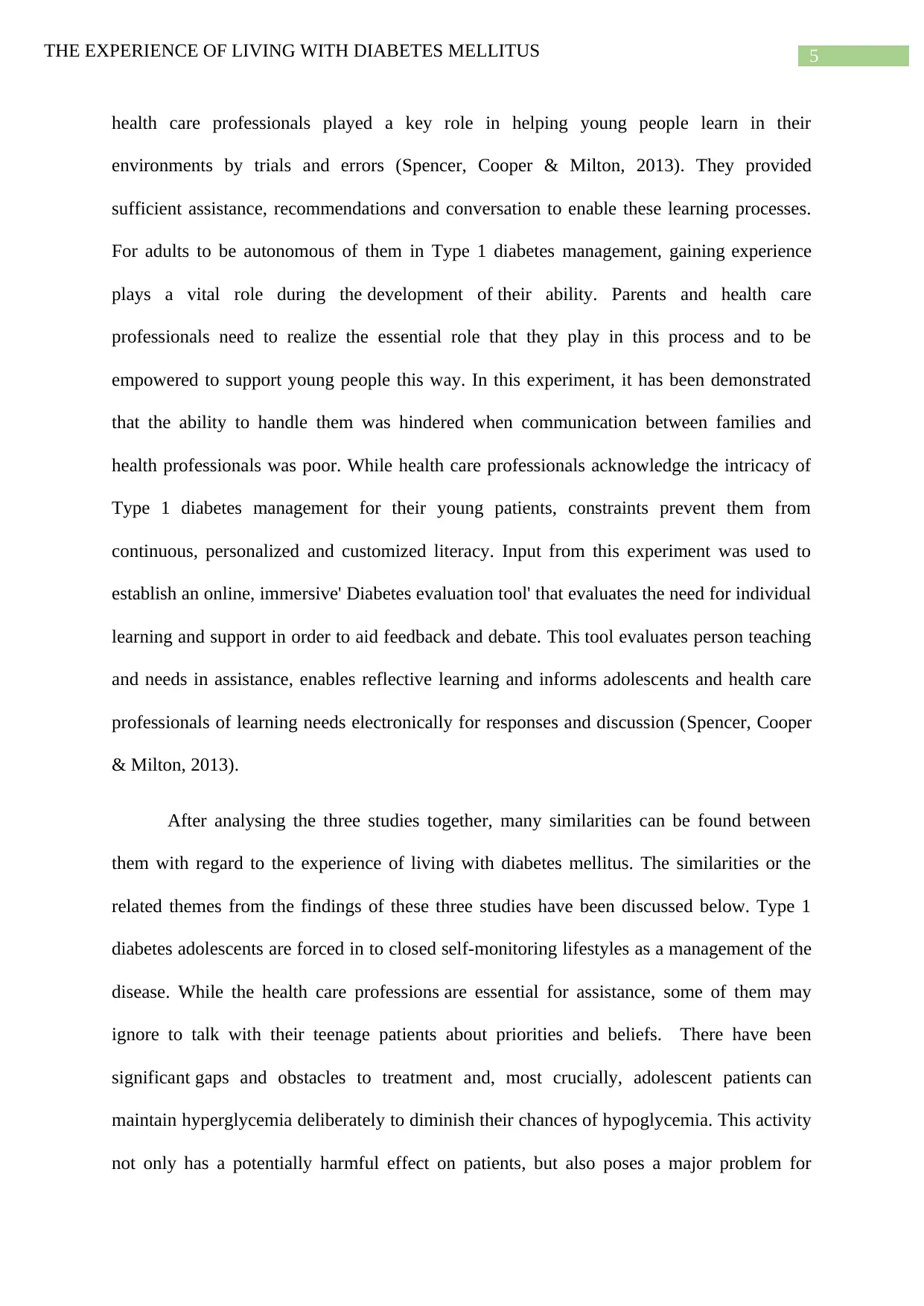
5THE EXPERIENCE OF LIVING WITH DIABETES MELLITUS
health care professionals played a key role in helping young people learn in their
environments by trials and errors (Spencer, Cooper & Milton, 2013). They provided
sufficient assistance, recommendations and conversation to enable these learning processes.
For adults to be autonomous of them in Type 1 diabetes management, gaining experience
plays a vital role during the development of their ability. Parents and health care
professionals need to realize the essential role that they play in this process and to be
empowered to support young people this way. In this experiment, it has been demonstrated
that the ability to handle them was hindered when communication between families and
health professionals was poor. While health care professionals acknowledge the intricacy of
Type 1 diabetes management for their young patients, constraints prevent them from
continuous, personalized and customized literacy. Input from this experiment was used to
establish an online, immersive' Diabetes evaluation tool' that evaluates the need for individual
learning and support in order to aid feedback and debate. This tool evaluates person teaching
and needs in assistance, enables reflective learning and informs adolescents and health care
professionals of learning needs electronically for responses and discussion (Spencer, Cooper
& Milton, 2013).
After analysing the three studies together, many similarities can be found between
them with regard to the experience of living with diabetes mellitus. The similarities or the
related themes from the findings of these three studies have been discussed below. Type 1
diabetes adolescents are forced in to closed self-monitoring lifestyles as a management of the
disease. While the health care professions are essential for assistance, some of them may
ignore to talk with their teenage patients about priorities and beliefs. There have been
significant gaps and obstacles to treatment and, most crucially, adolescent patients can
maintain hyperglycemia deliberately to diminish their chances of hypoglycemia. This activity
not only has a potentially harmful effect on patients, but also poses a major problem for
health care professionals played a key role in helping young people learn in their
environments by trials and errors (Spencer, Cooper & Milton, 2013). They provided
sufficient assistance, recommendations and conversation to enable these learning processes.
For adults to be autonomous of them in Type 1 diabetes management, gaining experience
plays a vital role during the development of their ability. Parents and health care
professionals need to realize the essential role that they play in this process and to be
empowered to support young people this way. In this experiment, it has been demonstrated
that the ability to handle them was hindered when communication between families and
health professionals was poor. While health care professionals acknowledge the intricacy of
Type 1 diabetes management for their young patients, constraints prevent them from
continuous, personalized and customized literacy. Input from this experiment was used to
establish an online, immersive' Diabetes evaluation tool' that evaluates the need for individual
learning and support in order to aid feedback and debate. This tool evaluates person teaching
and needs in assistance, enables reflective learning and informs adolescents and health care
professionals of learning needs electronically for responses and discussion (Spencer, Cooper
& Milton, 2013).
After analysing the three studies together, many similarities can be found between
them with regard to the experience of living with diabetes mellitus. The similarities or the
related themes from the findings of these three studies have been discussed below. Type 1
diabetes adolescents are forced in to closed self-monitoring lifestyles as a management of the
disease. While the health care professions are essential for assistance, some of them may
ignore to talk with their teenage patients about priorities and beliefs. There have been
significant gaps and obstacles to treatment and, most crucially, adolescent patients can
maintain hyperglycemia deliberately to diminish their chances of hypoglycemia. This activity
not only has a potentially harmful effect on patients, but also poses a major problem for
⊘ This is a preview!⊘
Do you want full access?
Subscribe today to unlock all pages.

Trusted by 1+ million students worldwide
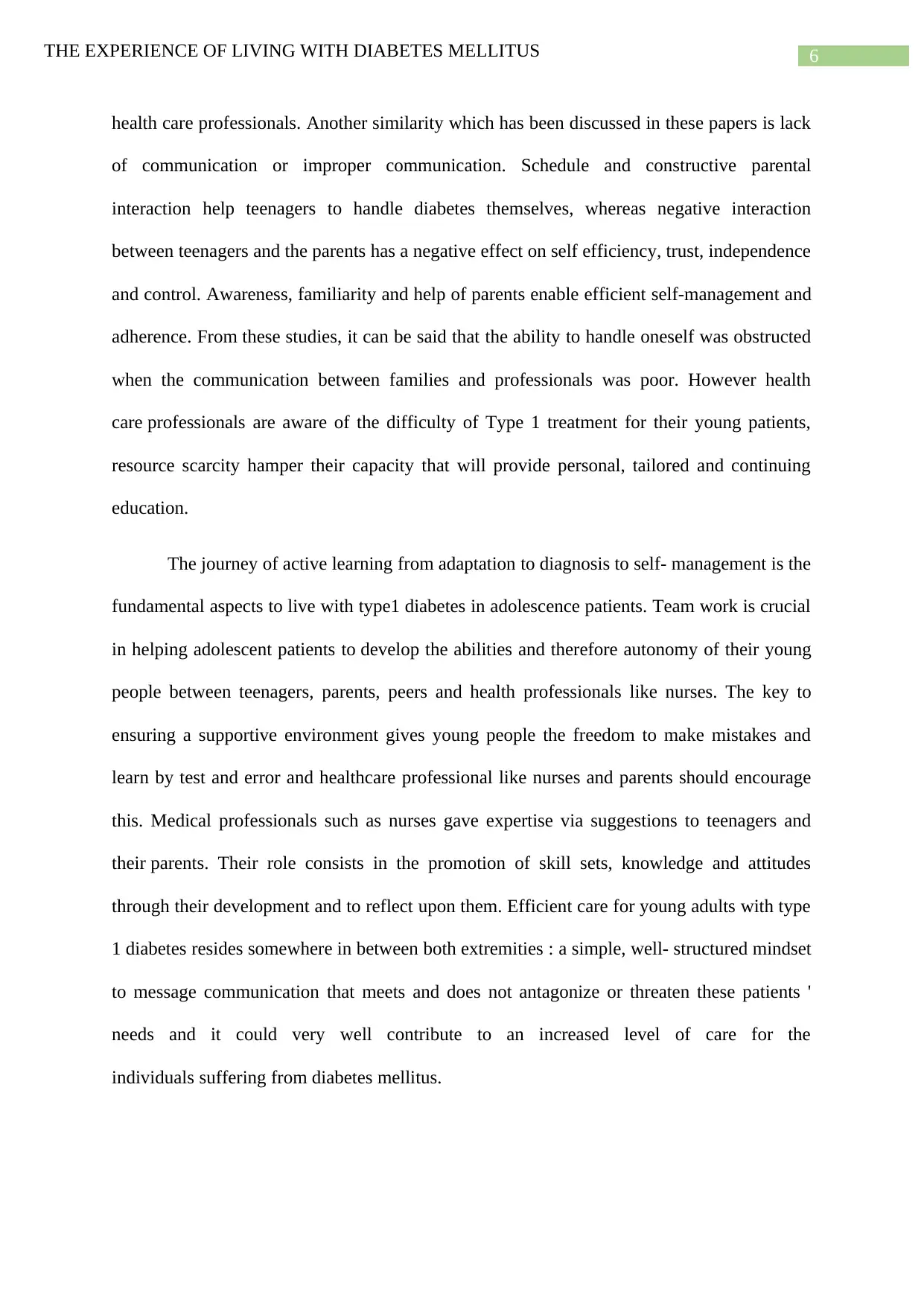
6THE EXPERIENCE OF LIVING WITH DIABETES MELLITUS
health care professionals. Another similarity which has been discussed in these papers is lack
of communication or improper communication. Schedule and constructive parental
interaction help teenagers to handle diabetes themselves, whereas negative interaction
between teenagers and the parents has a negative effect on self efficiency, trust, independence
and control. Awareness, familiarity and help of parents enable efficient self-management and
adherence. From these studies, it can be said that the ability to handle oneself was obstructed
when the communication between families and professionals was poor. However health
care professionals are aware of the difficulty of Type 1 treatment for their young patients,
resource scarcity hamper their capacity that will provide personal, tailored and continuing
education.
The journey of active learning from adaptation to diagnosis to self- management is the
fundamental aspects to live with type1 diabetes in adolescence patients. Team work is crucial
in helping adolescent patients to develop the abilities and therefore autonomy of their young
people between teenagers, parents, peers and health professionals like nurses. The key to
ensuring a supportive environment gives young people the freedom to make mistakes and
learn by test and error and healthcare professional like nurses and parents should encourage
this. Medical professionals such as nurses gave expertise via suggestions to teenagers and
their parents. Their role consists in the promotion of skill sets, knowledge and attitudes
through their development and to reflect upon them. Efficient care for young adults with type
1 diabetes resides somewhere in between both extremities : a simple, well- structured mindset
to message communication that meets and does not antagonize or threaten these patients '
needs and it could very well contribute to an increased level of care for the
individuals suffering from diabetes mellitus.
health care professionals. Another similarity which has been discussed in these papers is lack
of communication or improper communication. Schedule and constructive parental
interaction help teenagers to handle diabetes themselves, whereas negative interaction
between teenagers and the parents has a negative effect on self efficiency, trust, independence
and control. Awareness, familiarity and help of parents enable efficient self-management and
adherence. From these studies, it can be said that the ability to handle oneself was obstructed
when the communication between families and professionals was poor. However health
care professionals are aware of the difficulty of Type 1 treatment for their young patients,
resource scarcity hamper their capacity that will provide personal, tailored and continuing
education.
The journey of active learning from adaptation to diagnosis to self- management is the
fundamental aspects to live with type1 diabetes in adolescence patients. Team work is crucial
in helping adolescent patients to develop the abilities and therefore autonomy of their young
people between teenagers, parents, peers and health professionals like nurses. The key to
ensuring a supportive environment gives young people the freedom to make mistakes and
learn by test and error and healthcare professional like nurses and parents should encourage
this. Medical professionals such as nurses gave expertise via suggestions to teenagers and
their parents. Their role consists in the promotion of skill sets, knowledge and attitudes
through their development and to reflect upon them. Efficient care for young adults with type
1 diabetes resides somewhere in between both extremities : a simple, well- structured mindset
to message communication that meets and does not antagonize or threaten these patients '
needs and it could very well contribute to an increased level of care for the
individuals suffering from diabetes mellitus.
Paraphrase This Document
Need a fresh take? Get an instant paraphrase of this document with our AI Paraphraser
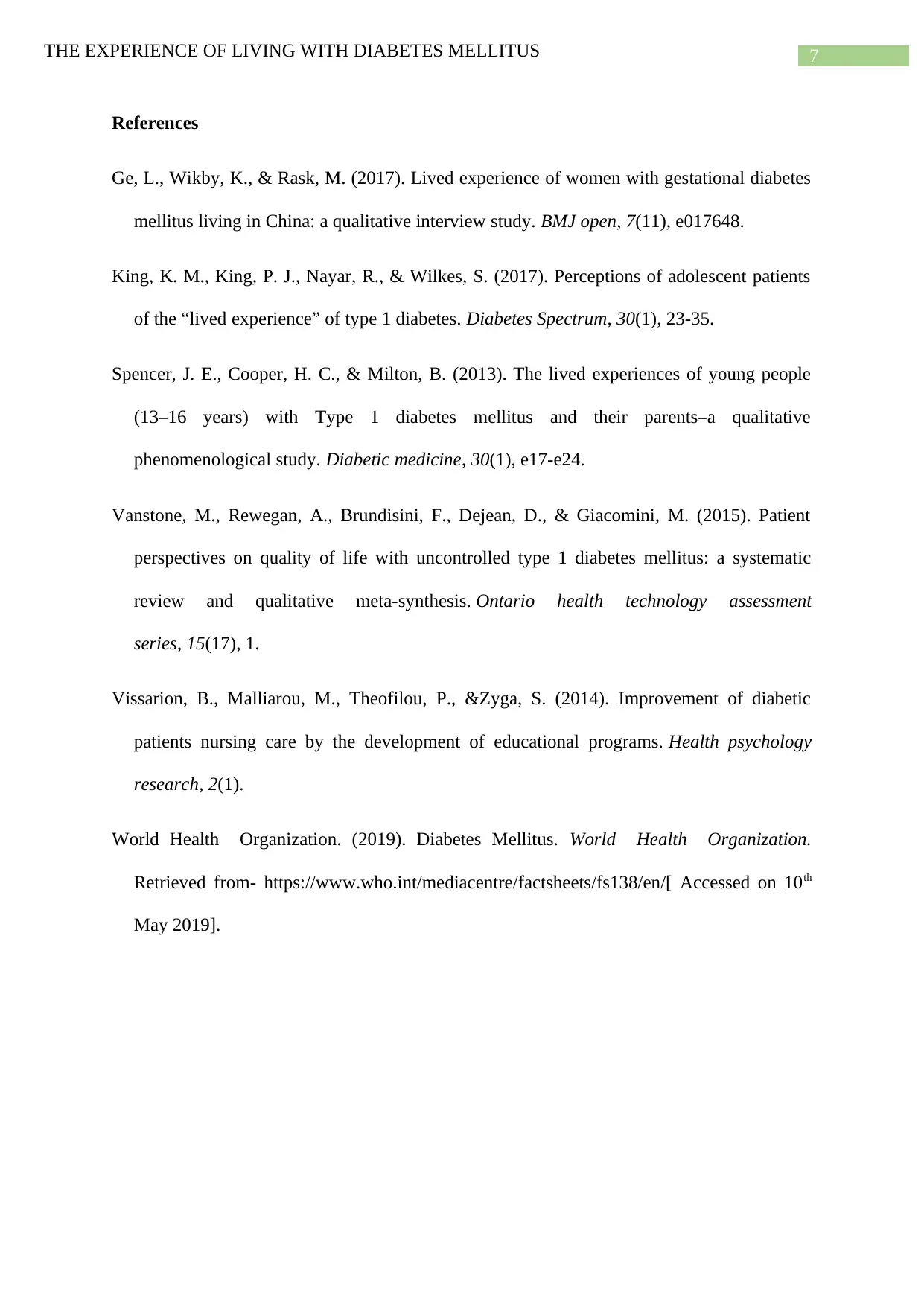
7THE EXPERIENCE OF LIVING WITH DIABETES MELLITUS
References
Ge, L., Wikby, K., & Rask, M. (2017). Lived experience of women with gestational diabetes
mellitus living in China: a qualitative interview study. BMJ open, 7(11), e017648.
King, K. M., King, P. J., Nayar, R., & Wilkes, S. (2017). Perceptions of adolescent patients
of the “lived experience” of type 1 diabetes. Diabetes Spectrum, 30(1), 23-35.
Spencer, J. E., Cooper, H. C., & Milton, B. (2013). The lived experiences of young people
(13–16 years) with Type 1 diabetes mellitus and their parents–a qualitative
phenomenological study. Diabetic medicine, 30(1), e17-e24.
Vanstone, M., Rewegan, A., Brundisini, F., Dejean, D., & Giacomini, M. (2015). Patient
perspectives on quality of life with uncontrolled type 1 diabetes mellitus: a systematic
review and qualitative meta-synthesis. Ontario health technology assessment
series, 15(17), 1.
Vissarion, B., Malliarou, M., Theofilou, P., &Zyga, S. (2014). Improvement of diabetic
patients nursing care by the development of educational programs. Health psychology
research, 2(1).
World Health Organization. (2019). Diabetes Mellitus. World Health Organization.
Retrieved from- https://www.who.int/mediacentre/factsheets/fs138/en/[ Accessed on 10th
May 2019].
References
Ge, L., Wikby, K., & Rask, M. (2017). Lived experience of women with gestational diabetes
mellitus living in China: a qualitative interview study. BMJ open, 7(11), e017648.
King, K. M., King, P. J., Nayar, R., & Wilkes, S. (2017). Perceptions of adolescent patients
of the “lived experience” of type 1 diabetes. Diabetes Spectrum, 30(1), 23-35.
Spencer, J. E., Cooper, H. C., & Milton, B. (2013). The lived experiences of young people
(13–16 years) with Type 1 diabetes mellitus and their parents–a qualitative
phenomenological study. Diabetic medicine, 30(1), e17-e24.
Vanstone, M., Rewegan, A., Brundisini, F., Dejean, D., & Giacomini, M. (2015). Patient
perspectives on quality of life with uncontrolled type 1 diabetes mellitus: a systematic
review and qualitative meta-synthesis. Ontario health technology assessment
series, 15(17), 1.
Vissarion, B., Malliarou, M., Theofilou, P., &Zyga, S. (2014). Improvement of diabetic
patients nursing care by the development of educational programs. Health psychology
research, 2(1).
World Health Organization. (2019). Diabetes Mellitus. World Health Organization.
Retrieved from- https://www.who.int/mediacentre/factsheets/fs138/en/[ Accessed on 10th
May 2019].
1 out of 8
Related Documents
Your All-in-One AI-Powered Toolkit for Academic Success.
+13062052269
info@desklib.com
Available 24*7 on WhatsApp / Email
![[object Object]](/_next/static/media/star-bottom.7253800d.svg)
Unlock your academic potential
Copyright © 2020–2026 A2Z Services. All Rights Reserved. Developed and managed by ZUCOL.





